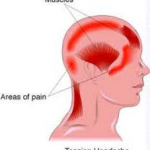What is a Tension Headache?
Imagine squeezing a stress ball with your hands as hard as you can until it molds into the shape of your hand. The amount of tension and pressure you put on that ball varies from person to person. Now, imagine that stress ball was your head and your hand was a band around your forehead. The pressure applied to your head causes huge headaches known as tension headaches, muscle contraction headaches or even stress headaches that linger for approximately 30 minutes to lasting the whole day. This pressure causes pain or discomfort in your head, scalp, or neck. This discomfort is usually a response to head injuries, STRESS, or even depression.
Symptoms
Signs and symptoms of a tension headache include:
- Dull, aching head pain
- tightness or pressure across your forehead or on the sides and back of your head
- Tenderness on your scalp, neck and shoulder muscles
Tension headaches are divided into two main categories — episodic and chronic.
Causes/Risk factors
Tension headaches usually arise from stress or any type of strain mainly in your head. For example, starring at a computer screen too long can cause eyestrain that can lead to sensitivity, blurred vision, eye irritation and severe headaches that can hinder your concentration. A way to help reduce eye strain is to cut as much computer glare out. 1) You can put a glare screen protector, 2) move around the room and find dimmer lighting, or 3) buy a lamp that can evenly distribute the light around the screen.
Other risk factors of tension headaches can be disturbed concentration, sensitivity to light or even noise etc. Stress is the most commonly reported trigger for tension headaches.
Lifestyle and home remedies
Think you might have a tension headache? Try these simple home remedies that can possibly make these headaches go away:
1) Follow a regular schedule: Don’t skip meals, especially breakfast. Getting the daily nutrients and vitamins you need in the morning will help boost your metabolism. Make sure to get 8 hours of sleep nightly. Try to exercise 30 or more minutes a day. It keeps your body in shape and improves your mood. Finally, make sure to drink 6 to 8 glasses of water/ day. Drinking lots of water helps maintain the balance of body fluids, it helps energize your muscles and increases your muscle performance.
2) Make sure to keep a journal or notepad of the things you need to get done for that day. Scheduling helps organize the work load and reduces the amount of stress that will reduce tension headaches.
3) Go hot or cold. Applying heat or ice — whichever you prefer — to sore muscles, may ease a tension headache.
Here is some more information on how to manage tension headaches.
